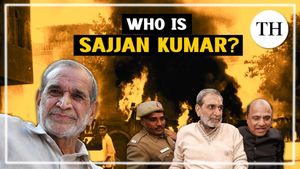A political storm is brewing as the South Korean National Assembly finds itself embroiled in deep disputes over the national budget. This turmoil is compounded by the impeachment trial of President Yoon Seok-yeol, setting the stage for significant political fallout.
On February 25, 2025, the Constitutional Court held its final arguments for the impeachment of President Yoon, drawing attention from all corners. Observers await the President's final statements, which could shape the future of his presidency and the administrative agenda moving forward. The political atmosphere is tense, with lawmakers from opposition parties making their case for Yoon's removal.
Among various issues, budget priorities are at the forefront of the National Assembly debate. Lawmakers are grappling with fiscal constraints but differing views on resource allocation. The opposition, particularly the Democratic Party, has criticized Yoon's administration for failing to account for the urgent needs of the public amid economic challenges.
"A sincere apology is necessary, not just a superficial one," remarked Kim Min-ha, emphasizing the expectation for the President to take accountability for his administration’s actions. This sentiment resonates widely within the legislative body, as representatives express their desire for transparency and seriousness from the head of state.
What complicates the narrative is the stakes surrounding the impeachment process itself. Yoon's impeachment is pivotal, not only for his political career but also for the country’s governance. If the Constitutional Court deems his actions unconstitutional, this could trigger early elections, significantly impacting South Korea's political structure and future policy directions.
Yet, voices within Yoon’s camp suggest they might pivot to less conventional strategies to shore up support. Speculation is rife over Yoon possibly discussing constitutional amendments during his final statements, creating scenarios where he could address electoral concerns head-on. It poses the question—could his proposals unite various factions of his party and garner support from the moderate base?
Commentators believe these moves are strategic, aimed at preventing the looming division among conservative voters. "If Yoon mentions constitutional amendments, it can create conditions where moderate and strong support levels merge," noted political analysts observing the situation.
The political maneuvering doesn't end there—the opposition has its own strategies to undercut Yoon’s administration. They not only contest the budget but challenge presidential decisions perceived to exacerbate public distress. With impeachment proceedings capturing public attention, the Democratic Party has sought to leverage any perceived missteps by the administration to bolster their standing.
Meanwhile, public sentiment appears to be fluctuated by the scrutiny of presidential decisions and legislative discussions. Should the Constitutional Court lean toward impeachment, this could give rise to higher voter engagement during early elections, with potential shifts favoring the Democratic Party.
Intriguingly, there is growing discourse around how the outcome of these trials and disputes may shape legislative effectiveness post-impeachment. Will the imperative for decisive governance take precedence over political rivalries? The next couple of weeks seem pivotal for both South Korean politics and the current government.
Overall, as the National Assembly debates, and the outcome of the impeachment trial looms, every statement, every vote carries significant weight—impacting not just the immediate political framework but the longer-term governance of the Republic of Korea.



